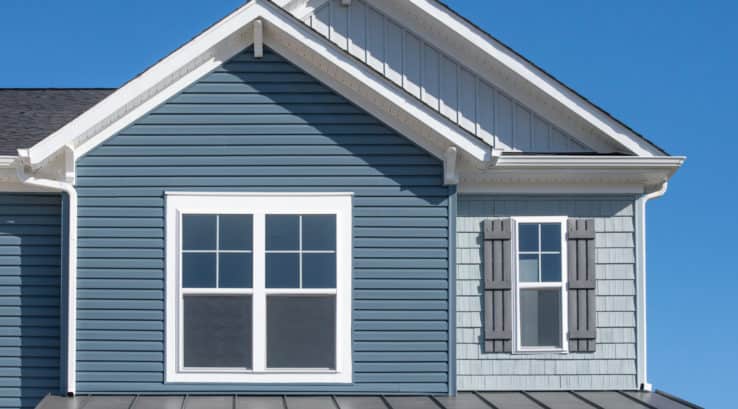If you’re looking for the most energy efficient siding for homes, there are a variety of factors to consider. Read this guide to ensure that you select the ideal siding for your needs.
Energy Efficient Siding for Homes
In addition to reducing your carbon footprint, selecting energy efficient siding can help you to manage overall energy costs better by decreasing your energy bill and reducing the strain and wear on your HVAC system. Energy efficient siding for homes should also improve the home value, increase comfort, and reduce the maintenance required to keep your siding performing as it should.
There are many different kinds of siding available. To simplify your search, here are the most energy efficient siding materials and their pros and cons.
Wood
Pros:
- Wood is a naturally insulating material, so it ranks well for energy-efficiency.
- Wood siding provides a classic and desirable appearance on a home, improving its overall aesthetic.
- Available in a large variety of paints and stains.
- It’s an eco-friendly option as it is recyclable and biodegradable.
- Durable and long-lasting if properly maintained.
Cons:
- Although durable, wood requires regular repairs, including painting and staining, to fix or avoid holes, warping, and rotting. Incorrect maintenance can create more extensive issues, requiring larger and more expensive repairs.
- Wood is vulnerable to fire damage and may not be well suited to hotter areas with increased fire risk.
- Wood is an expensive siding option.
Stucco
Pros:
- Effective, energy efficient insulation.
- Stucco provides an attractive look for your home.
- When properly maintained, some stucco can last a lifetime.
- Resistant to fire and pests.
- Paint throughout the material makes repainting unnecessary.
Cons:
- Can be equally as expensive as wood siding.
- Stucco can be susceptible to rain damage, so it may be poorly suited to rainier areas.
- When not mixed with epoxy, stucco can crack and require expensive repairs.
Vinyl
Pros:
- Vinyl siding is thermally resistant, making it highly energy-efficient, especially when paired with foamed siding.
- It’s cost-effective, as the material is less expensive and can be easily retrofitted.
- Vinyl is available in many styles and colors.
- It’s highly resistant to harsh weather and hides minor damage, so it requires less maintenance.
- The material is recyclable.
Cons:
- Repainting vinyl can be tricky and sometimes voids its warranty.
- A damaged panel typically requires a complete replacement.
- Vinyl may need to be replaced after only 10 to 20 years.
Fiber Cement and Composite Siding
Pros:
- Composed of either cement materials or wood fibers, fiber cement and composite siding are the more affordable alternative to natural stone or wood siding.
- Wood materials retain natural insulation.
- Fire and pest resistant.
- Lower maintenance than wood siding and may last up to 50 years.
Cons:
- Although durable, cement products are non recyclable.
- Though less costly, fiber cement isn’t as energy-efficient as stone.
Steel Siding
Pros:
- Steel siding keeps homes cooler.
- Steel and aluminum are recyclable materials.
- Available in a variety of styles to provide an attractive modern look.
- Durable material means that it’s low maintenance and resistant to weather, fire, and pests, lasting up to 50 years.
Cons:
- While more affordable than wood, steel and aluminum siding is still expensive.
- A poor choice for homes in colder regions as it does not retain heat well.
- May rust or fade over time.
Find the Right Energy Efficient Siding for Your Home
If you’re looking to improve the energy efficiency of your home, it’s necessary to consider these different siding options with the needs of your home in mind. The ideal siding can ensure that you reduce your energy costs and carbon footprint, as well as improve other aspects of your home, such as value, appearance, and comfort.
The siding that you choose for your home is important. For a professional and qualified evaluation, contact Thompson Creek.


